On The Record with USA Water Polo’s Chris Ramsey: Present, Past, Future (Continued)
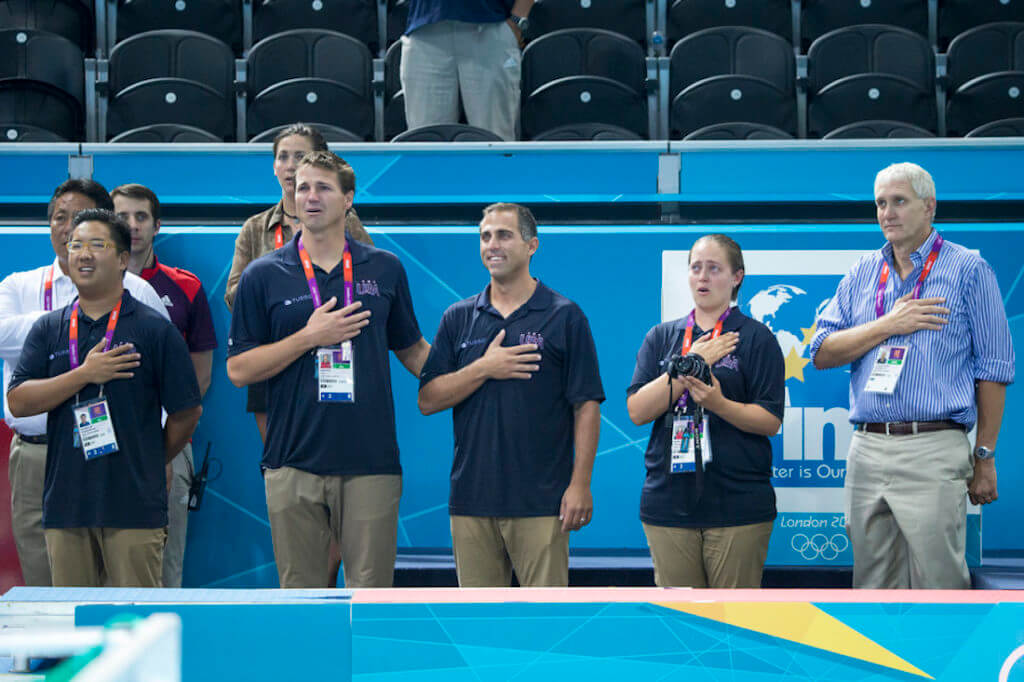
Continuing Swimming World’s exclusive interview with Christopher Ramsey, CEO of USA Water Polo, the conversation picks up with USAWP’s executive director discussing financial challenges due to the cancellation of a majority of the organization’s premier events—including the Junior Olympics, the world’s largest polo tournament—because of the COVID-19 lockdown.
Ramsey also spoke about USAWP Board Chair Michael Graff’s contribution to the organization the past 14 years. Graff, who twice has been extended by as board chair, has become one of the most recognizable figures in American polo. Scheduled to leave the board later this year, there are questions of how the organization will continue their board chair’s and CEO’s efforts through this current Olympic cycle and beyond.
Editor’s Note: following is an edited and condensed transcript of a conversation on January 8 with Christopher Ramsey. The interview has been split into two sections; Part I was published on January 19.
***
– The Junior Olympics appears to be like the masters’ degree applicants who provide financial support for university’s PhD programs. Could one say that its the membership who sustain our national team programs?
One of the things we’ve done is streamline the pyramid, so that people understand it. There’s local club participation, there are clubs that want to send teams to national and regional tournaments, Then, there’s ODP [Olympic Development Program], where you can get involved at that level and see very clearly how you get to make an Olympic team.
We’ve tried to do that for referees and coaches, and to make it much clearer what the path is.
I think it’s been really positive and people love it.
– A big nut to crack is how athletes from outside California can break into the upper echelon of USAWP’s talent pool. You know these challenges because of Bill Smith and what he’s accomplished with Greenwich Aquatics and their drive to develop athletes who can compete at a high level. It’s working: Ian Davidson said recently that he views Greenwich athletes as roughly equal to California’s top polo athletes.
That’s flattering. I’ll tell you personally, I was involved with Bill because I lived in Greenwich and worked in New York. I was a volunteer coach and it’s great that Ian and others in California now view Greenwich as an equal rival. That’s a great accomplishment. The most satisfying thing to me is writing college recommendations for every kid on my 12U [Greenwich] team who not only wanted to go to college but also play water polo in college.
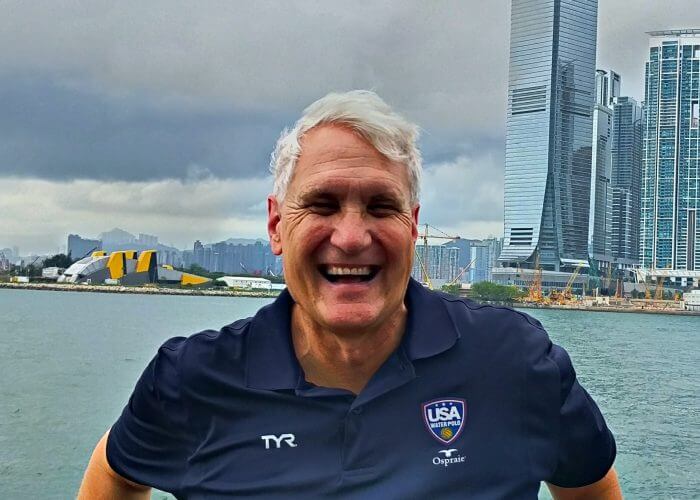
Photo Courtesy: Artem Zinger
That’s part of what motivated me to take this job: recognizing the really positive impact that a great sports experience can have on kids and their lives. Not everybody’s going to make an Olympic team, but however far you get there’s a lot of value.
I was proud those kids asked me to write those recommendations, and I still keep track of a lot of them and what they’re doing with their lives.
– 14 years with the organization, coming up on four Olympics, what are some noteworthy accomplishments that you and USAWP have achieved during that time?
The proviso I need to say up front is: Nobody does anything by themselves. One of the things I’ve learned working at USA Water Polo is the importance of a team approach. A lot of the accomplishments on the part of the organization—they’re the result of a lot of people. It’s not just me; I’m only one of the cogs in the wheel here.
Our financial accomplishments—we keep metrics here which I put in the annual report. One of them is: Are we able to gain and devote more resources to our sport? We have a great track record doing that and that’s one thing I feel very good about, going from near bankruptcy and a deficit of $750,000 to the financial position we are in now, is like night and day.
I’m very proud that we were able to do that and use those resources to become one of the fasted growing sports in the U.S. I’m also proud that we doubled our membership since I’ve been here and we’re now growing at a faster rate outside California than in the state.
Overhauling Junior Olympics. It’s become the largest water polo tournament in the world and is something everybody looks forward to every year, and it gets better every year. I remember a couple of years ago at Stanford, walking around and seeing a USA Water Polo studio outside the pool, with interviews of Ashleigh Johnson watched by a bunch of kids with their water polo hats on.
It’s not only become a tremendous competition but a place for our community to gather. I’m really pleased about what’s happened with JOs.
I mentioned the membership growth and what I would say is: topping 50,000 members for the first time in 2019 is a really big deal. Really proud of that.
I’m really proud of our evolution of safety rules and procedures and the discipline with which that was done. I’m proud of the board of directors we’ve been able to recruit. These are exceptional people who care deeply about the sport. That’s been a part of my experience in working with large non-profits with boards, to use their talents and energy effectively.
Gotta say I feel pretty good about the women’s team. Don’t know that I deserve much credit beside bringing Adam Krikorian in and making sure that he and that group have the resources that they need. The women’s success has shadowed my tenure here; we hadn’t won a gold medal until we got here and brought Adam in. We have now and are looking for our third in a few months in Tokyo—I’m really proud of the women and their performance.
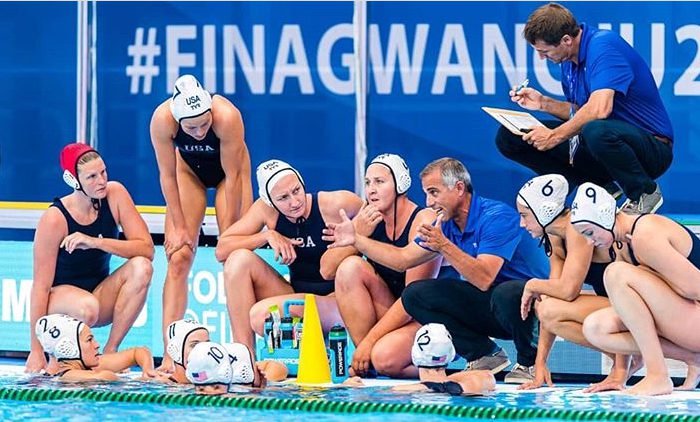
Adam Krikorian with the USA women’s team at the 2019 FINA World Championships. Photo Courtesy: Orange Pictures
The empowerment of women, the growth of women on our staff—I think we’re now two-thirds women on our staff—on our board, where we’re a third women, and our membership. That’s tremendous: women are fabulous role models for all the members in our sport.
Our Olympic women and their performance are just inspiring to me on all levels.
I’m pretty psyched about the guys, too. We got that silver medal in 2008—it had been 20 years. We’ve made a lot of strides in rebuilding that team and integrating the ODP program. You saw our team get their Olympic qualification at the Pan American Games in Peru; I think there’s some real talent there. I’m very eager to see how they do.
Since we’re talking about our men’s and women’s teams, I want to say I’m proud that there’s equal funding for men and women, both at the national team level and within our organization. My philosophy has been that men and women deserve an equal chance at making an Olympic team and competing. We’ve always tried to divide the resources for those two teams down the middle, and we pretty much have.
There are other sports in the Olympic movement that have a lot of controversy about who gets paid what, but we haven’t had that in part because our philosophy is that women and men deserve an equal chance. We’ve done that from a revenue point of view and that’s part of the foundation in how we treat one another.
Finally, I would say organizational stability. The point of the criticisms mentioned earlier—there are some who would say I’ve been around too long or others have, but I believe there has been a lot of change in all regards over the 14 years I’ve been here. The organization has become more stable, more talented and has increased its capabilities. That’s why the results we are seeing here. I also think our community has become far more generous.
When I started there was $35,000 coming in charitable contributions. This year ballpark we’ll probably have $1.5 million coming in—including $700,000 in annual fund contributions. Those dollars go directly to athletes—programs for growth and programs for high performance. Wonderful, absolutely wonderful!
More than 10% of our members give—what an endorsement of the organization and what it’s doing.
Those are some of the things that we should all be proud of, and don’t spend too much time on this.
– This is about recognition; people who want to be critical—which is their right—also need to see the context within which these things are occurring over your tenure.
The only other thing I’ll say about it is—just like in sports—being an executive and in organization like this, you’re only as good as what you get done the next day. The board holds me to that standard and I think we all try and hold each other to that standard.
– What may be your and Mike Graff’s enduring legacy is not what the American men and women do this summer in Tokyo but what they do at the 2024 Olympics in Paris and 2028 Games in Los Angeles. If USAWP is to continue on a path of sustained growth, who are those board members who will step up when Graff steps down?
First, this organization is beyond fortunate to have had Mike’s leadership. His generosity, his passion for the sport and also his ability to make and back tough decisions, which is really important if you want to get things done. This is a guy—Harvard, MIT educated—but he’s a polo guy. He came out in his summers to play at Golden West College to sharpen his game.
He loves the sport and the people in it; his level of contributions across the board, the things I’ve learned from him as an executive—I’m talking about Mike, not me—continues to go on. He’s in many ways a savant and we couldn’t be more fortunate to have him.
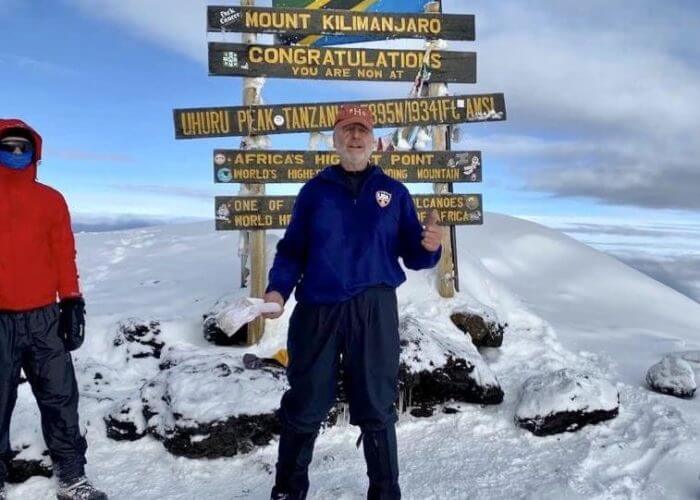
Mike Graff at the peak of Mt. Kilimanjaro. Photo Courtesy: USA Water Polo
His is a legacy of transformation and success now that he’s leaving water polo—and I hope he’ll still be involved and part of our family even after he moves on from this role.
We still have a national training center and stadium that we have to get built and I know that Mike cares passionately about that project.
Whatever else I can say about Mike, it’s not enough. He’s been an extraordinary ambassador for our sport and we’ve been incredibly lucky to have him.
Your other question is about the board and potential leadership. I can’t reveal about succession, it’s something that the board will want to make decisions about—what they’re going to reveal and when. Certainly, at the [2021 General] Assembly, more details will be communicated.
If you look at our board of directors, every single person is a leader, including the athlete representatives. I would say there’s so much leadership on this board that it’s somewhat difficult to wrap your arms around the possibilities.
They’re incredibly capable—certainly with different skills—we can only be optimistic about the future and the role the board will have. I want to add one other things, which is how positive I am about the Racial Equity and Reform Task Force and the work that they’re doing, and how that informs how the board will continue to evolve, how our staff will continue to evolve and, I hope, how our sport will continue to evolve.
[USA Water Polo Racial Equality & Reform Task Force Hosts Town Hall Discussions on Zoom]
We want everyone to have an opportunity to play water polo, no matter who or where they are. There are historic barriers to public swimming pools among communities of color and we want to do away with that in water polo.
I think there will also be an infusion of more leadership from diverse areas. We’ve made a lot of progress, and I think people may underestimate how committed our board of directors is because it comes out in board minutes. You know how committed they are because our board members because are in your community.
All of our members should have a tremendous degree of confidence in the board of directors and the capability and leadership skills that exist there. How those resources get divided up to accomplish goals will be decided over the next few months.
– The biggest challenge in the pandemic is the financial hit that USAWP has taken because of a ban on all live events. How has the organization’s approach to fundraising been impacted by the pandemic?
We exceeded our targets for charitable giving this year, which to me underscored the confidence people on a broad base have in our organization and our goals, and the buy-in for those goals.
[First-Ever Cancellation of Water Polo Junior Olympics Underscores USAWP Financial Challenges]
We underwent austerity, and that has been an important key to where we are. Our revenues are somewhat scalable; that is, when we do events it costs money to do them and they throw off some money as well. Generally, those are break-even propositions because we want our members to have opportunities—we’re not looking to charge top market rates. We want to be sure to run high-quality events.
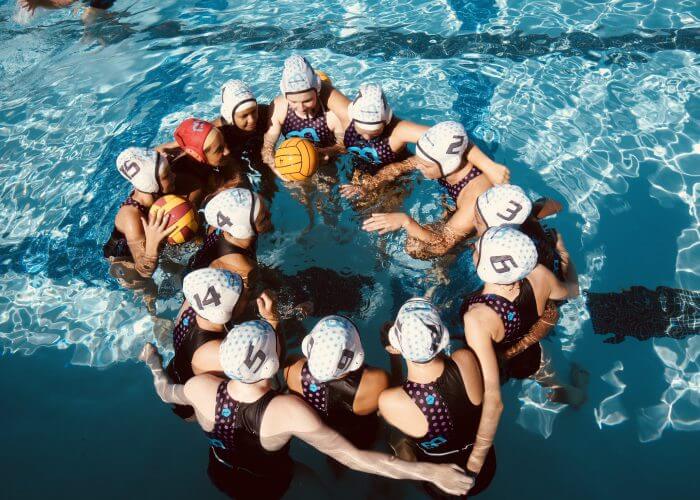
2018 Junior Olympics. Photo Courtesy: Everardo Luna
Things are scalable, and that will be one part of this. We’ve put together a balanced budget for the 2021-22 year. It gives our national teams at the Olympics everything they need to be successful. If the pandemic takes a bad turn and the Olympics is cancelled and the Junior Olympics can’t go forward, we’ll have to adapt again.
Based upon what we know now, we think that Junior Olympics will go forward and that the Olympic Games in Tokyo will go forward. There may be some changes; it may not have a lot of people outside of Japan going there. Or, they may not have live audiences at all – like the NBA – the Games may be played without spectators.
Those are unanswered questions, but one thing that’s clear to me is that Japan is being stalwart in keeping their word to host the Games. They have every intention of putting the Games on. They may have to make adjustments but I think there will be an Olympic Games.
In terms of our revenue, getting the Olympic Games, the Junior Olympics and ODP back up in various forms are keys to how we operate and I believe we’re going to be successful.



